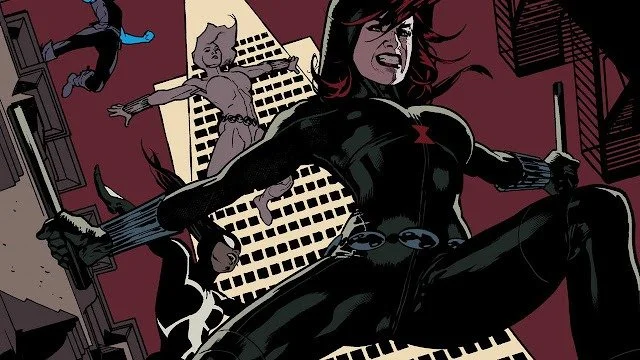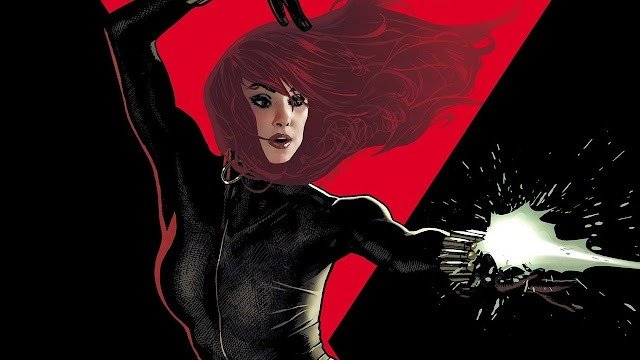Why Natasha Romanoff Has One Of The Most In-Depth Backgrounds In Marvel
Natalia Alianovna Romanova, or as we know her in the MCU, Natasha Romanoff, was created by Don Rico and Don Heck, alongside the late Stan Lee for Marvel Comics, and it was probably one of the best decisions he could have made. Now, that sentence likely outed me as a major Natasha stan, and it's the truth. Natasha, or Nat, has years of delicately laced backstory that dares to shred into politics, government secrets, identity, and the concept of redemption (which is one of the many things it seems Marvel is based on). Natasha's backstory is a mess that takes years to sort through but in a good way! I will give you a crash course on why I believe she has one of the most in-depth character backgrounds in the Marvel universe, comic and cinematic, respectively.
To start off, I want to focus on COMIC history. Most articles focusing on Natasha always seem to start with the MCU, which I totally get! But, in truth, the MCU is nothing compared to Natasha's history of comic background. I think the MCU truly dropped the ball on getting those details right when I hold the comics I have read so far near and dear to my heart. In fact, this project catapulted me into comics a close friend recommended to me to grow my knowledge. There's simply so much you can hardly get a grasp on them unless you are an avid reader!
RELATED:
Natasha's Comic History
As a brief reminder, Natasha Romanoff is an orphan picked up by the Russian organization called the Red Room, where she was transformed into a deadly assassin. However, that's not how she started. Natasha's backstory has been reworked multiple times in her comic run. However, it's not until the "modern age" of Marvel comics that the Red Room comes into play.
Natasha Romanoff was first introduced in Tales of Suspense #52. This specific issue was released in April 1964. Her basic comic biography is somewhat similar to the MCU but with more specifics. She was still a Russian spy, and she still defected to the United States, but she started out as an antagonist in Iron Man's story. This era of comics was considered the "silver age," and it stemmed through the '50s-'70s. Natasha's goal at this point was to kill Tony Stark, and she tried hard! She ultimately failed twice, and the Russians were disappointed, so they decided to brainwash Natasha and send her on her way to America to try again, only for her to fail again. Of course, the Russians saw only wasted potential, so they shot her. She survived the wound with the help of Hawkeye, who happened to be a villain at the time. He took her to the nearest hospital and defected from his own evil doings to join the Avengers.
When Marvel shifts into the "bronze age" of Marvel comics, Natasha is following a solo way of life. She was still doing what she could to find her footing in the universe. Her eye-catching black suit came into the comics at this point, and Natasha did what she could to prove herself by attacking Spider-Man. She failed yet again but decided to take it with her head up high and go after whatever villain she could! Following this, a partnership with Daredevil took off wonderfully and nearly granted the duo a TV show (that David Bowie wanted, surprisingly!) However, the partnership died down as Daredevil's readers grew, and Natasha found herself again brainwashed by HYDRA after taking a S.H.I.E.L.D. gig. She also tried a hand at forming her own superhero group, only for financial woes to cause bankruptcy that forced her back into the solo way of life.
And then we meet the "modern age" of Marvel. This period is where Natasha truly began to find her way into who she was supposed to be. She had a husband named Alexei, who ultimately managed to wreak havoc on Natasha's life and try to kill her in more than one instance. Alexei even faced death himself, but not permanently. The Modern Age also happened to be the introduction of Yelena Belova, a character that claimed the title of Black Widow and caused some conflict between the two widows. My favorite piece of conflict was the extreme measure of Natasha surgically swapping their faces, which down the line caused an identity crisis in Yelena. Soon their deadly dance comes to a partial end, and they begin teaming up more often than not despite not trusting one another completely. Yelena was even one of three characters who rescued Natasha from a disaster that gave her a completely false life and a child. (Black Widow #3, 2020)
Modern age Marvel at first glance heavily featured Natasha in its varying comics. From a relationship with Daredevil to deep and rich Russian ties, the comic version of our favorite spider has been through many dangerous encounters and survived to tell the tale, just barely. The comic universe is constantly growing and establishing new pieces of information with it. It only makes me wish that these pieces would find a better footing in the MCU, like, for instance, Natasha being able to hold Mjolnir. Can you imagine the visuals from that kind of storyline?
Natasha's MCU History
The Natasha we all know and love, and in my case, grew up with, is drastically different from her comic counterpart. To start, she does not enter the MCU as an enemy of Tony Stark but, in fact, his undercover assistant at Stark Industries in Iron Man 2. Natasha was working for Fury at the time, keeping an eye on him to track the progression of the illness ravaging his body. Natasha injected him with a vial that staved off the potentially deadly infection. This movie is where we establish just how much Natasha can do independently. Whether it's taking down a hallway of men singlehandedly or pulling off hiding in plain sight.
Natasha's next movie drops her into Avengers, where she helps S.H.I.E.L.D. gather the stars of the MCU to defeat an alien threat. This is where Natasha seems to find her footing among the big shots, pulls out a ton of impressive saves in fight scenes, and asks all the right questions. The scene that explains the most about Natasha is her exchange with Loki after his capture. She speaks of her Russian past and her red ledger. Loki being Loki, picks up on little details and mentions a vital piece of information for the future, but he cannot figure out that Natasha is playing him. Showing vulnerability allows Natasha to squeeze information that helps the team prepare for the unexpected. They make it out of it all alive, barely, but not much else is truly revealed from her backstory besides the basics of her identity.
Captain America: The Winter Soldier is where it starts getting deep. Winter Soldier is my all-time favorite MCU flick. It brings in some big players and gives a better look at Natasha's history and spy capabilities. It also proves that she has deep connections with those she spends her time with, even if it doesn't seem like they are on the same page. We learn about her history with the Winter Soldier, who Natasha has more than just a few dangerous encounters with, in the comics.
Bucky and Natasha in the comics are very close. They had a romantic relationship, trained together, and fought each other all the same. It wasn't always perfect, but they were consistent most of the time. Their paths crossed in the Red Room and blossomed from there. However, the MCU just BARELY hints at a past with them. In Winter Soldier, we hear Natasha mention that she was shot by James, or The Winter Soldier, while protecting an engineer. Winter Soldier utilizes Natasha's training to get a one-up on James and awakens a subtle realization for James that maybe she was familiar with him. It's not directly mentioned, but some subtle line deliveries make it possible.
After Captain America: The Winter Soldier, we come to Age of Ultron. With the introduction to the fantastic Wanda Maximoff, we get a deep dive into the depths of Natasha's memories of the Red Room and their dodgy practices. We see her training and trauma, including the involuntary hysterectomy. While it was brought into this movie as a plot device to justify the random romance that sparked between Banner and Natasha. They speak of children, and Natasha reassures him that she is unable to have them even if she tried. As heartbreaking as it is, I feel that Age of Ultron did a great job peeking into her trauma.
Next up is Civil War. Civil War dives back into that subtle hint of a past with Bucky but primarily focuses on Natasha's skills outside of fighting. She does still kick butt, but in this movie, the rest of the team relies on Natasha to use her skills in political environments, pep talks, and negotiations within the group. In this film, she seems to be the cornerstone but also struggles with her internal conflict regarding the accords. This film runs directly into the long-overdue Black Widow solo project that stems from her past and her choices in Civil War beginning to catch up to her.
As mentioned, we FINALLY get a Black Widow solo movie from there. It's not totally the movie most fans dreamed of, but it still serves a purpose for the MCU of filling in the gap between Civil War and the final gap of this phase of the MCU. Truthfully, Black Widow's solo film was poorly executed. I understand that comics and movies aren't always accurate to one another, but to me, Marvel could have done better with the story. Yelena (an enemy turned somewhat ally in the comics) and Alexei (Natasha's husband that tried and tried again to kill Natasha and died a few times himself) are both portrayed as Natasha's spy "family" in the movie, with Yelena being her little sister and Alexei, her father, respectively. It's an odd story choice to go with, but I can say the characters are well played in their new identities. Melina's character in the comics was a woman tired of living in the shadow of the Black Widow, and therefore she did everything in her power to rid the world of Natasha, calling herself Iron Maiden. She was a wonderful and determined character that always kicked back hard. In this film, Melina is Natasha's "adoptive" mother.
Natasha finds herself separated from her family at the beginning of the film and forced back into the Red Room with Yelena. Unfortunately, Alexei moves on to bigger and better things that land him in prison, and Melina takes the information that their spy family stole for the Red Room and begins creating the main culprit of the film, a chemical mixture that allows control over a person or animal's free will. This is a mixture used to control Yelena in the Red Room, noting that chemical subjugation and psychological conditioning are two different things that both Yelena and Natasha experienced in the MCU. After the events of Civil War, Natasha goes into hiding yet again, finds herself in trouble, and returns to Budapest with the antidote to said chemical mixture that Yelena had sent to her. This leads our Spider on a crusade to tear down the Red Room with the help of her old adoptive family and finally kill Dreykov, the leader of the Red Room, in the process. That seems like a lot, but I promise the movie holds FAR more information.
From there, we all know exactly what happens in Infinity War and Endgame. These two events don't hold too much for character backstory, but it does contain a lot of character development. Natasha's character development from comic to MCU is so vast and in-depth that it brings multiple layers to her story and past. It weaves in and out of numerous storylines that come to an ultimate head in the MCU and an ongoing journey in the comics.
READ NEXT:
Source(s): Fun, IGN, The Ringer







